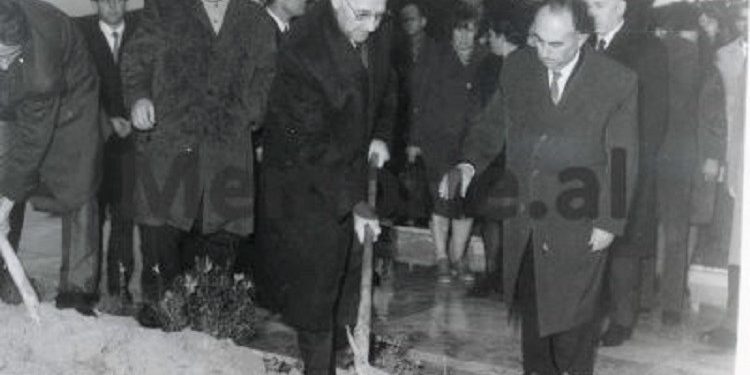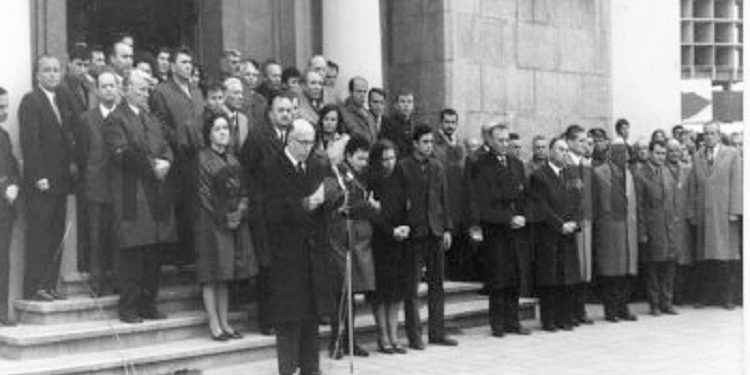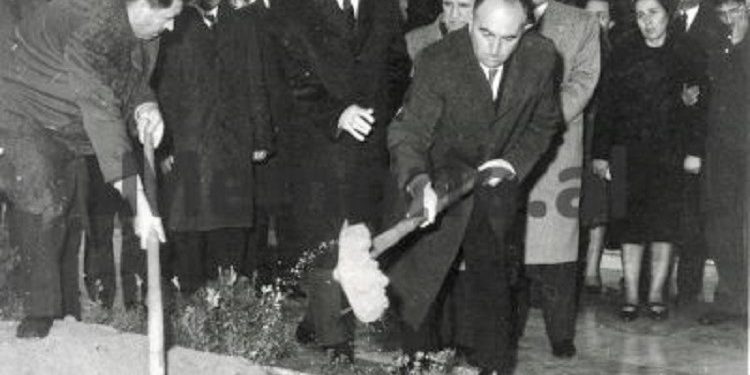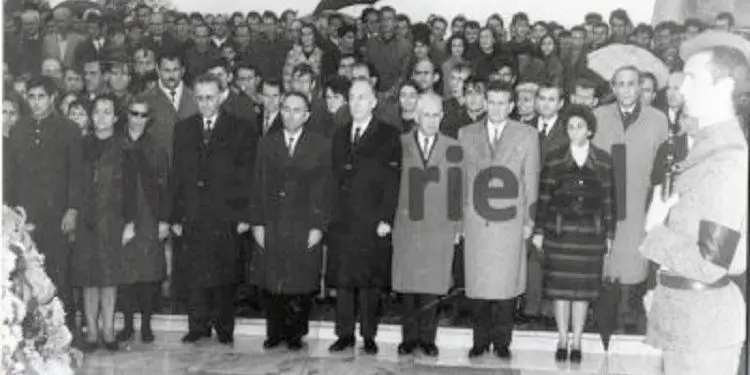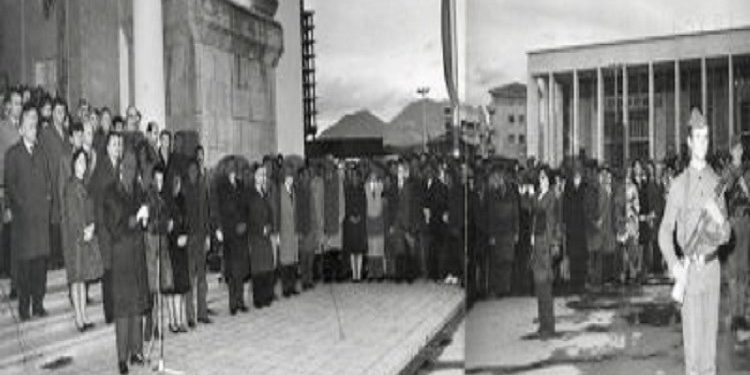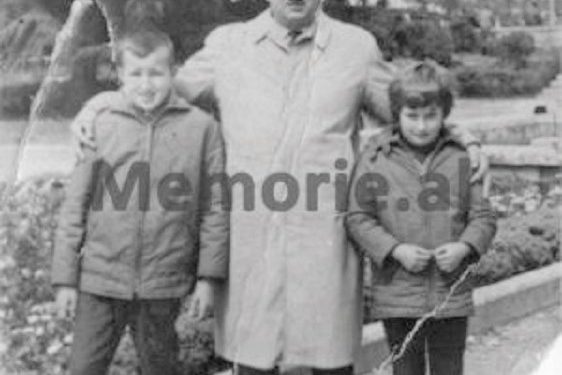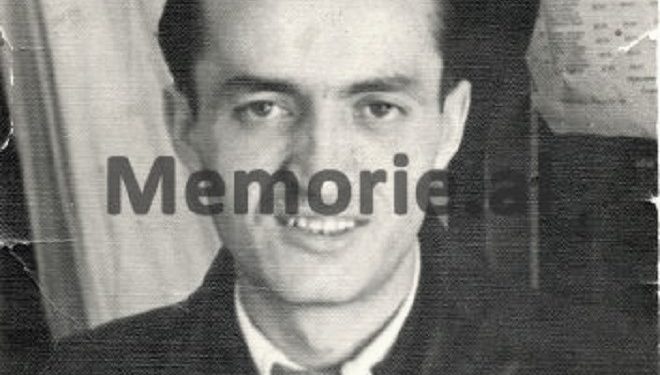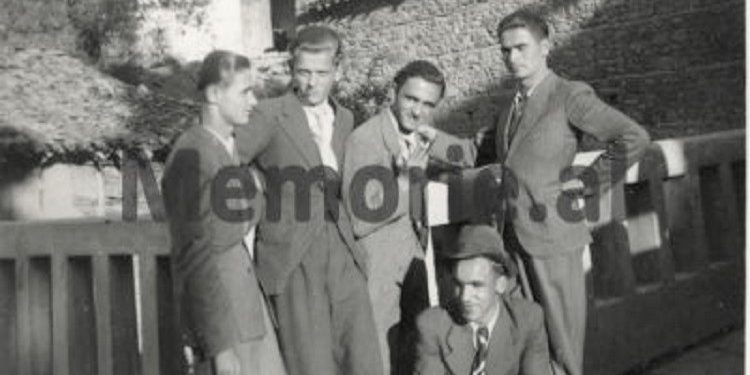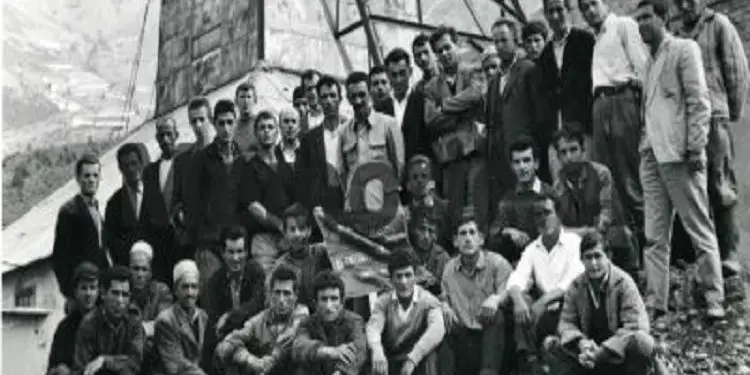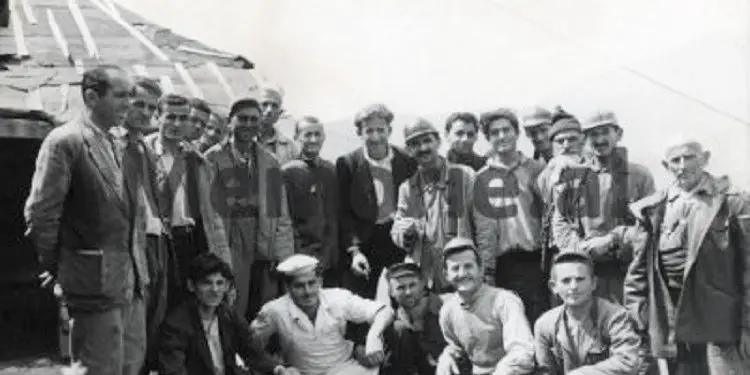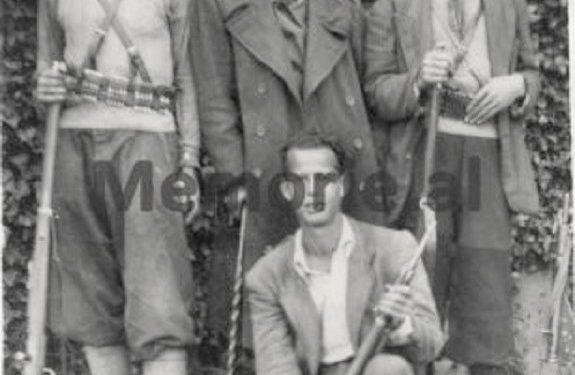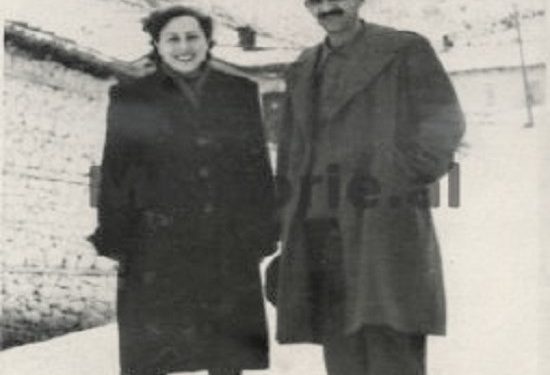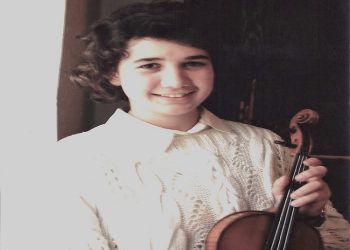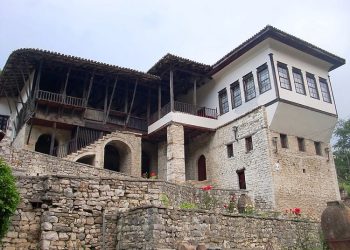Dashnor Kaloçi
Memorie.al publishes the unknown story of two brothers originating from the village of Boboshtica of Korça, who after engaging with the first communist groups in the Korça district and later taking active part in the Anti-fascist war as effective in partisan brigades, were sent to studies in Poland and the Soviet Union, where he graduated in Mechanical and Mining Engineering.
Returning to Albania and Professional Career: Todo as a chief engineer at the Bulqiza Mine where he worked for years with great dedication, which earned him the title of “Hero of Socialist Labor” and Member of the People’s Assembly Andrea, as attaché for the Agriculture Sector at the Albanian Embassy in Moscow and later at the Ministry of Agriculture and Machinery Import in Tirana, being one of the most highly regarded specialists.
The sudden death of Todo on November 6, 1974, and the official funeral ceremony in the square in front of City Hall attended by Prime Minister Mehmet Shehu and several ministers, members of the Political Bureau, MPs and other senior officials who accompanied him with great honors for in the last residence in the Martyrs’ Nation Cemetery and his name still holds the Bulqiza Mine today.
While his brother, Andrea, would be arrested only a few months later on charges of writing anonymous letters to Enver Hoxha about the arrests made in the oil sector, he was arrested and died in torture in the Tirana Investigation cell. , after refusing to declare himself an “enemy of the people” and his tomb still to be found three decades after the overthrow of the communist regime …
Who was Todo Mancho?
Todo Manço was born in Boboshtica village of Korça district on March 16, 1921, and he comes from a middle-class peasant family, after his father except for a clerk. He completed elementary school in the village and then attended the Korça Lyceum which he completed in 1941. In mid-1937, he came into contact with Niko Xoxi, one of the first communists of the Korça Group, with whom he continued ties. until the end of 1938 when he was recruited by Nesti Kerenxhi and Taqi Skëndi as a member of the “Work … Since then, and until the merging of communist groups, he has been involved in an active trio, as was the organization of communist cells at that time.
By the end of 1941, when delegates of the Communist Party Central Committee for Organizing the Party arrived in Korça, he was assigned to the Boboshtica, Drenovo and Ravonik village organization, responsible until mid-1942, when he was called to work in Korça and has been co-opted by the District Committee. In September of this year, Todo is forced to go illegally and after a month goes to the villages of Rrëza and Devolli to help organize the work of the party.
From December 1942 he went to the Devoll Detachment, sent by the District Committee in charge of the Detachment Party organization, until March 1943. From that time he stayed in the Gore-Opar districts with Nexhip Vinchani until the beginning of May, a time when, by order of the Central Committee, he was sent to Vlora where the so-called “Sadik Fraction faction” had emerged. Initially he works in the city with grassroots organizations, as the situation in the districts was unclear and after two or three weeks, he left town and participated in the organizations of the Drashovica, Mesaplik and Himara Party. At this time he was known by the nickname, “Çerçiz Hodo”, as he was illegal.
In mid-1943, Todo was sent as a deputy commissar to the Ismail Qemali Battalion, but was removed from office for laziness. He was later sent to the province of Mallakastra, but after the German operation began, he was forced to land in Kurvelesh and Mesaplik and after the party’s meeting in December 1943, he was relegated as commissar of the Company. IV, in the 4th Battalion, of the 5th Attack Brigade. He stayed here until the end of April 1944, when he was made available to the General Staff and from there, Liri Gega, with whom he had a controversy, sent him to Boboshtica, with the pretense of taking care of the materials coming out of it. Korça. He stayed here without any work and no one from Korça District remembered to get him out of this situation, instead one of the exponents suggested that he go to a teacher in a village.
Here too, in early August, he is wounded by the Germans, and is forced to stay in Pear for two months until the wound closes. From November 1944 Todo is assigned as Agitprop’s Officer in the 9th Attack Brigade and in early 1945 when the Brigade departs for Kruja, he goes to Tirana where he is assigned First Secretary at the Personnel Directorate of the Ministry of Internal Affairs, and more than head of the human resources branch in the same ministry.
During this time he was often dissatisfied with the progress of his work and for this reason, in July 1946, the Central Committee of the Albanian Communist Party issued a serious objection to his biography. From September this year, and for six months, he remained at the Prime Minister’s Office and was subsequently appointed Chairman of the Economic Branch at the Central Directorate of the Construction Materials Industry. In early 1948, he worked in the Administration Branch at the Ministry of Industry.
Since the end of the war Todo had sought to pursue higher education, as the jobs assigned to the administration did not give him any satisfaction and further strengthened his conviction to study and pursue a profession in life. This opportunity came to you in September 1948, when you were awarded a scholarship to study abroad.
So in late 1948 he left for Poland, in the city of Krakow, where he completed his studies at the Academy of Mines until March 1952, when he completed his studies and graduated with high scores. After that he returned to Albania and started working as an engineer at the Copper Mine in Rubik. In 1954 he moved from Rubik to Tirana where he worked for about 7 months as the Director of Mines at the Ministry of Industry, a job he gave up because he wanted to work in his profession. Thus, from March 1955 he transferred and began working as a chief engineer at the Bulqiza Chrome Mine.
Bulqiza Mine, a very important place in Todo Manço’s life
This mine has been in operation since 1948, but it had all the shortcomings and problems that a new mine could have in an underdeveloped country just after the war. In Bulqiza, Todo Mancho found a collective of miners who had long worked in the mine, such as: Kamber Duriqi, Ramadan Guzja, Islam Islami, Baftjar Fida and many others who had put their souls in the mine and worked with great dedication, which would cause Todo to find support in them. To develop the mine and improve extractive technology, in 1957, he, along with Kamber Duriqi, was sent to the Soviet Union, where he became acquainted with the experience of operating one of the mines in the Ural. Upon return, he tried and implemented the demolition technique, which was also praised at the Second Republic Award.
Work at the Bulqiza mine is the longest and most prominent period of his life, both professionally and personally. There he established a family with a girl from Tirana whom he had known in the ministry and since 1957 came to live with him in Bulqiza, despite the difficulties of living in this harsh place. The 1960s, as elsewhere in Albania, were years of hard work full of problems and difficulties, but the “Fitore” chrome mine grew and became the main chrome-mining mine in the Republic.
Chromium was of good quality and in this period was highly demanded in the international market; it occupied a major part of Albania’s exports, providing, in return, vital products for the people. In the early 1960s, at the 4th Congress of the PLA, he would be a candidate for the Central Committee of the PLA and in the years that followed he was a Member of the People’s Assembly for the Debar area for many legislatures.
These high duties and functions never separated him from the miners and the common people, and as such he always remained, simple among the common. All the inhabitants of Bulqiza at that time remember the “Prime ingineer”, as they said, as a quiet, quiet one who did not forgive the rules and discipline, who did not frequent the club, who never went to the billiards, which eventually overtime rushing home with bread under his arm. Once a week he would go down underground himself, with miners and in breakdowns or specials even more often, not being distinguished from ordinary workers. He loved people in general though he was very authoritarian in dealing with those who had nothing to do with him. Todo never took a class stance with individuals who for one reason or another were differentiated or had biographical problems with the communist regime. His criterion in evaluating people was their good character and their work.
The 1970s found the Bulqiza Mine in its apogee, for many reasons: the accumulated experience in all directions began to yield results; some improvement in technology; any new machinery; the level of people who had already grown; more engineering-technical personnel etc. (Generally the whole system had some flourishing during this period). The mine had already gained its normal working pace, involving rational exploitation of the mineral-bearing underground. It is known from reliable sources that Todo Manço has always been at odds with state plans when these based on Party orientations reflected inflated figures. According to him, “such exploitation of the mine could only be done by the occupier”, but by no means a state that should think about its own tomorrow. However, Todo Mancho has always been appreciated by all the structures of the state and this appeared when 1968, the year when he was awarded the “Hero of Socialist Labor”.
In 1973 he was appointed to the General Directorate of Chromium at Burrel, again in the post of chief engineer, a structure which he had termed “excessive chains” and which later merged. However, at the end of this year he leaves Bulqiza and settles in Burrel, with his family, where he did not stay for a year because he became ill. So in February 1974, the doctors of the Burrel Hospital sent him to Tirana for examination, after which he was eventually diagnosed with lung cancer (pulmonary carcinoma, as written in his death report). . Shortly after this period, he was appointed as an advisor to the Ministry of Heavy Industry and Mining, a task which he would not have liked to have done, but did not complete any day after developing his illness.
Todo Mancho, considered the legend of the Bulqiza Chromium Mine, passed away on November 6, 1974, at 11.30, in Tirana, then called the Leaders’ Clinic. He buries the next day, honored by the state and by anyone who knew him. The commemorative ceremony began at 11.00 am in the Executive Committee of Tirana and continued in the Nation’s Martyrs’ Cemetery, from which it was exhumed in the spring of 1993, to be re-buried in the Sharra Public Cemetery, where it is currently located.
Andrea Manço died in torture after anonymous letters to Enver Hoxha
Andrea Manço, like his brother Todi, was born in the village of Boboshtica in the district of Korca in 1926. He finished primary school in the village and then attended the Lyceum of Korca where he joined the Anti-Fascist National Liberation Movement, with his communist youth. village Boboshtica and assisted the movement within the village, as was the task of the organizational structures of Korça Region
After the war, Andrea moved to Tirana where he worked in various jobs, until the first half of the 1950s he was sent to study in Moscow, where he completed his undergraduate studies in Mechanical Engineering. After graduation he returned to Tirana and worked as a specialist in the Ministry of Agriculture, were at that time was Minister Maqo Çomo. Under this ministry he is sent as an agricultural attaché to the USSR for three years, working until the second half of the 1950s.
In the 1960s Andrea worked in the Department of Motor Vehicles in Tirana, where for a long time she was also the director of this department. While in office in 1975, he was arrested by the State Security on charges that he had written several anonymous letters to Enver Hoxha related to purges in the oil sector. After being held in the investigator for a year, barbarously tortured to admit and declare himself an “enemy of the people”, he begins a hunger strike from which he is transformed into a half-man and in this condition, with orders from “above” seek to eliminate it. So Andrea Manço had the tragic fate of being shot with Koço Plaku and Milto Gjikopulli (two famous engineers and leaders of the Albanian Oil Sector) on 28.VI.1976. According to the testimony of those who carried out his execution, he did not utter a final word as written in a report, and the burial site is not yet known! Memorie.al




